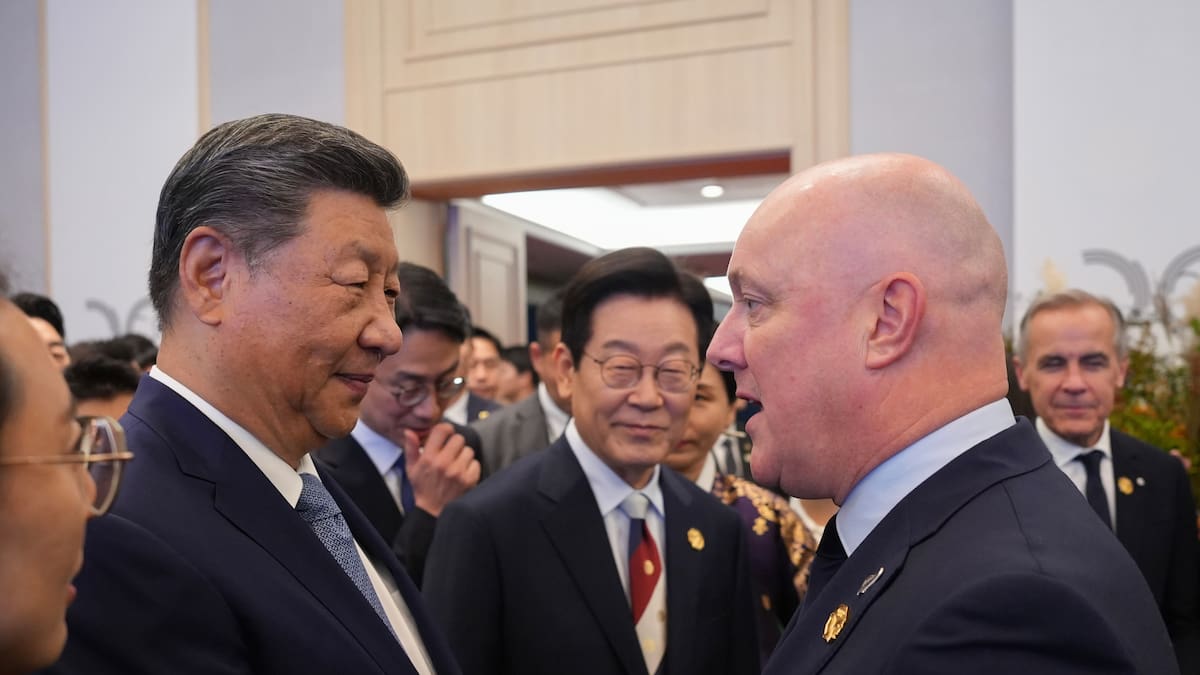“He knows New Zealand well. He’s visited a few times in the past. We’ve had a very big engagement with China.”
China is New Zealand’s largest trading partner, with two-way trade worth about $40 billion in the year to June.
Luxon said it was an “important” and “complex” relationship, with areas for further cooperation but also differences to be called out publicly and privately.
The leaders most recently met in June when Christopher Luxon was in Beijing. Photo / Supplied.
It means Luxon was able to get facetime with the leaders of the world’s two largest economies – he met US President Donald Trump on Wednesday – before flying home to New Zealand on Saturday night.
The Prime Minister said leaders at Apec were keen for it to continue to be a body to “invent and incubate and innovate new trading architecture”.
He also believed there was a “very strong feeling about wanting to work together and advance the rules-based system”. There was “huge momentum” for this.
Without specifically referring to Trump’s tariffs, Luxon said the “change in the trading environment” had been a “wake-up call” for some countries as they were “locked into” traditional trade partnerships and “they can’t move as flexibly as we’ve been able to”.
He believed New Zealand businesses were well-placed to deal with international tumult as they are “lean, mean, fit and they’re damn good”.
“They’re hugely agile and they can move between markets at a drop of a hat.”
One of the dominant themes of discussions has been around how countries can cooperate to make trade easier for all. Luxon said he had been pushing to “speed it up”.
Throughout his week’s trip to Asia – first to Malaysia for the Association of South East Asia Nations (Asean) summit, and then to Apec in South Korea – Luxon has met with a large number of world leaders either formally or for brief one-on-ones.
Those encounters have included Xi, Trump, Australia’s Anthony Albanese, Canada’s Mark Carney, Japan’s Sane Takaichi, Indonesia’s Prabowo Subianto, Malaysia’s Anwar bin Ibrahim, Abu Dhabi Crown Prince Sheikh Khaled bin Mohamed bin Zayed Al Nahyan and the heads of various South-East Asian nations.
There weren’t always tangible outcomes from these meetings, nor would the Prime Minister always share what was discussed. For example, he wouldn’t go into whether he raised tariffs with Trump during their private discussions.
Some of the arrangements – like brief pull asides at dinners – don’t allow for extensive conversations about issues, but rather just provide facetime between leaders.
Prime Minister Christopher Luxon met a number of world leaders for dinner on Wednesday. Photo / Jamie Ensor / Pool
There were some announcements from the trip, however, like new upgrades to our relationship with Asean and Korea and progress on a halal agreement with Malaysia.
Luxon said he enjoyed this part of being Prime Minister.
“It’s what I see as a core part of my job, which is to make sure I’m advocating very strongly for New Zealand. I’m building relationships.
“I’m trying to get New Zealand to punch above its weight, to have more influence than its natural size would dictate it do so.”
He wanted Kiwis to see the “massive world of opportunity” for New Zealand and that “we’re living in the most dynamic region in the world”.
Jamie Ensor is a senior political reporter for the Herald, travelling with the Prime Minister in Asia this week.

